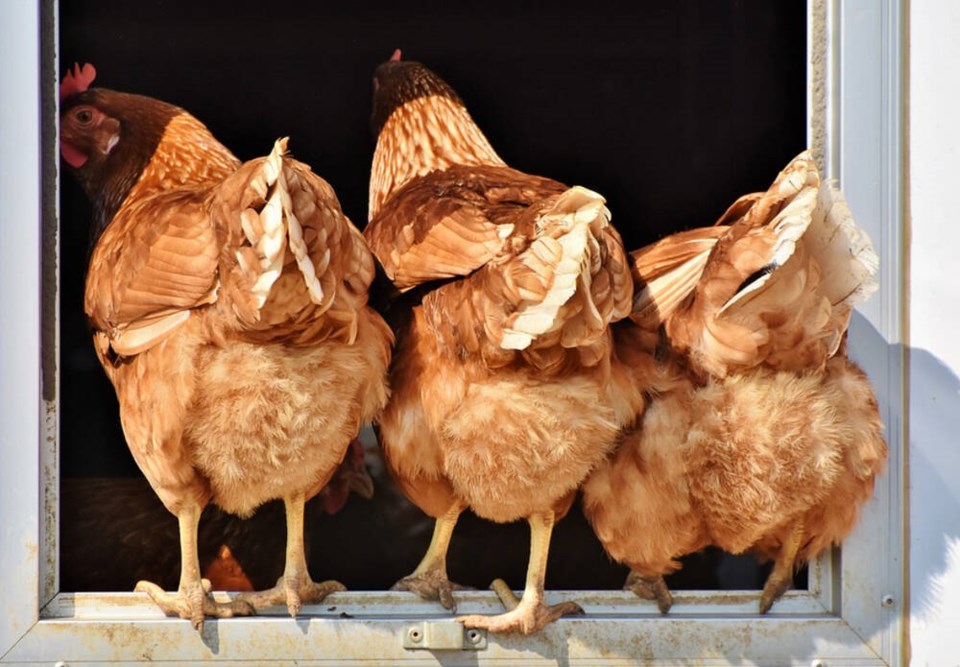The province’s chief veterinarian has lifted an order preventing commercial poultry flocks from being outside, allowing some B.C. chickens their first breath of fresh air in nine months.
The original order required B.C. farmers to keep commercial flocks inside to prevent avian influenza infections and included organic and free-range birds, which must have access to the outside to be labelled as such.
“We’re quite happy the order has been lifted,” said the B.C. SPCA manager of animal welfare Melissa Speirs. “It’s been a tricky time. The balance between hen welfare and hen health can be at odds in some cases.”
B.C.’s chief veterinarian Theresa Burns said she lifted the order a few weeks ago after determining the avian flu risk had decreased with the start of summer.
She noted the current avian influenza outbreak has been “globally unprecedented,” as it has both lingered longer and caused more problems than past outbreaks. Over the last 18 months in B.C., 104 flocks have been infected, leading to the deaths of millions of domestic birds.
Burns said that while the risk seems to have eased in North America after the spring wild bird migration, cases have continued to plague Europe.
In terms that echoed much of the speculation around COVID, Burns said it is unclear what will happen to the highly infectious H5N1 avian influenza virus when the wild bird migration begins again in the fall. Cases could gradually decline as wild birds begin to develop immunity, or the virus could mutate and become more contagious.
“We really can’t predict what will happen,” she said.
Avian flu has typically been seasonal in B.C., with several outbreaks since 2004, when 16 million birds in the Fraser Valley had to be culled.
B.C. farmers have drastically increased biosecurity measures since.
I can say there is no complacency,” said Burns.
But with protocols already in place, there is less that can be done to improve biosecurity, and gains are “incremental”.
The province has increased education aimed at small flock owners, while keeping commercial poultry flocks inside during wild bird migrations reduces the chance of infections, said the chief vet.
But the health protocols also raise questions about food labelling regulations.
In a post on a community Facebook page earlier this week, some Chilliwack residents argued about whether eggs could still be called free-range if chickens were not allowed outside during the avian flu outbreak.
Yarrow organic egg farmer Juschka Clarke called the circumstances impacting B.C. “extreme.”
She said she understood the need to keep her birds indoors in compliance with the order and noted Canadian organic regulations allow that in exceptional circumstances.
“We’re doing everything we can,” she said. “Farming can be challenging at the best of times. When you add this, it’s a very intense time.”
Clarke said that once avian flu enters a barn, “there’s not a lot of hope for the birds,” and the results are “devastating” for for the animals and farmers.
She said her birds enjoy being outside in warm weather.
Speirs said the SPCA recommends people look for animal welfare certified labels such as Animal Welfare Approved, Certified Humane, and Global Animal Partnership when purchasing eggs, chicken and turkey. To be certified, farmers must provide more space and enrichment when birds are indoors.
She said about 72 per cent of B.C. eggs still come from hens in cages, while eight per cent are free-run, meaning they roam around inside a barn. About 20 per cent of B.C. eggs are free-range or organic, meaning birds must have some outside access.
“It’s been a long nine months,” she said. “We hope this year will be better for the birds.”



